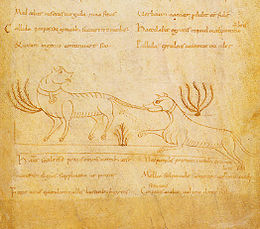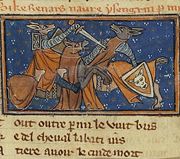
Ysengrimus
Encyclopedia

Anthropomorphism
Anthropomorphism is any attribution of human characteristics to animals, non-living things, phenomena, material states, objects or abstract concepts, such as organizations, governments, spirits or deities. The term was coined in the mid 1700s...
series of fable
Fable
A fable is a succinct fictional story, in prose or verse, that features animals, mythical creatures, plants, inanimate objects or forces of nature which are anthropomorphized , and that illustrates a moral lesson , which may at the end be expressed explicitly in a pithy maxim.A fable differs from...
s written in 1148 or 1149, possibly by the poet Nivardus. Its chief character is Ysengrimus the Wolf
Gray Wolf
The gray wolf , also known as the wolf, is the largest extant wild member of the Canidae family...
, and it describes how his various schemes are overcome by the trickster
Trickster
In mythology, and in the study of folklore and religion, a trickster is a god, goddess, spirit, man, woman, or anthropomorphic animal who plays tricks or otherwise disobeys normal rules and conventional behavior. It is suggested by Hansen that the term "Trickster" was probably first used in this...
figure Reinardus
Reynard
Reynard is the subject of a literary cycle of allegorical French, Dutch, English, and German fables largely concerned with Reynard, an anthropomorphic red fox and trickster figure.-Etymology of the name:Theories about the origin of the name Reynard are:...
the Fox
Red Fox
The red fox is the largest of the true foxes, as well as being the most geographically spread member of the Carnivora, being distributed across the entire northern hemisphere from the Arctic Circle to North Africa, Central America, and the steppes of Asia...
.
The author
Little is known of the author. All that can be said of him with any certainty is that he lived in the twelfth century, and was closely connected to GhentGhent
Ghent is a city and a municipality located in the Flemish region of Belgium. It is the capital and biggest city of the East Flanders province. The city started as a settlement at the confluence of the Rivers Scheldt and Lys and in the Middle Ages became one of the largest and richest cities of...
. The text is anonymous in the manuscripts containing the whole poem. Florilegia and medieval catalogues give the author's name variously as "Magister Nivardus", "Balduinus Cecus" (Baldwin the Blind), and "Bernard".
The poem
The Ysengrimus draws on earlier traditions of beast fableBeast fable
The beast fable or beast epic, usually a short story or poem in which animals talk, is a traditional form of allegorical writing. It is a type of fable in which human behaviour and weaknesses are subject to scrutiny by reflection into the animal kingdom....
in Latin, such as the eleventh century Ecbasis captivi
Ecbasis captivi
The Ecbasis captivi is an anonymous Latin beast fable that probably dates to the middle of the 11th century, and was likely written in the Vosges region of France...
; in the Ecbasis, the now traditional opposition of wolf and fox appears. The Ysengrimus is the most extensive anthropomorphic beast fable extant in Latin, and it marks the first appearance in Latin literature of the traditional names "Reinardus" and "Ysengrimus". The poem runs to 6,574 lines of elegiac couplet
Elegiac couplet
The elegiac couplet is a poetic form used by Greek lyric poets for a variety of themes usually of smaller scale than the epic. Roman poets, particularly Ovid, adopted the same form in Latin many years later...
s. The Ysengrimus is divided into seven books, which contain twelve or fourteen tales; opinions differ on how to divide them. Other beast fables were written by other medieval Latin authors, including Odo of Cheriton
Odo of Cheriton
Odo of Cheriton was a Roman Catholic preacher and fabulist.He visited Paris, and it was probably there that he gained the degree of Master...
; the Ysengrimus is the most extensive collection of this material either in Latin or in any vernacular.
The poem mixes medieval
Medieval Latin
Medieval Latin was the form of Latin used in the Middle Ages, primarily as a medium of scholarly exchange and as the liturgical language of the medieval Roman Catholic Church, but also as a language of science, literature, law, and administration. Despite the clerical origin of many of its authors,...
and classical Latin
Classical Latin
Classical Latin in simplest terms is the socio-linguistic register of the Latin language regarded by the enfranchised and empowered populations of the late Roman republic and the Roman empire as good Latin. Most writers during this time made use of it...
imitations and parts of it are written in a curious, difficult style featuring obscure verb
Verb
A verb, from the Latin verbum meaning word, is a word that in syntax conveys an action , or a state of being . In the usual description of English, the basic form, with or without the particle to, is the infinitive...
forms such as deponent
Deponent verb
In linguistics, a deponent verb is a verb that is active in meaning but takes its form from a different voice, most commonly the middle or passive. A deponent verb doesn't have active forms; it can be said to have deposited them .-Greek:...
imperatives
Imperative mood
The imperative mood expresses commands or requests as a grammatical mood. These commands or requests urge the audience to act a certain way. It also may signal a prohibition, permission, or any other kind of exhortation.- Morphology :...
. These stylistic curiosities reflect neither deliberate obscurantism nor lack of poetic talent: they are, instead, means of characterization. The poet places them on the lips of the trickster Reinardus, who is intended to be deceptive, and whose statements contain deliberate ambiguity. Ysengrimus is made to speak in a similar style when he is lying. But when he has been deceived into a predicament, he speaks plainly.

Ice fishing
Ice fishing is the practice of catching fish with lines and fish hooks or spears through an opening in the ice on a frozen body of water. Ice anglers may sit on the stool in the open on a frozen lake, or in a heated cabin on the ice, some with bunks and amenities.-Locations:It is a popular pastime...
using his tail
Tail
The tail is the section at the rear end of an animal's body; in general, the term refers to a distinct, flexible appendage to the torso. It is the part of the body that corresponds roughly to the sacrum and coccyx in mammals, reptiles, and birds...
as a net, only to get it frozen into the lake. When Reinardus mockingly urges Ysengrimus to get up quickly, Ysengrimus is made to say:
- Captus ad hec captor: "Nescis quid, perfide, dicas
Clunibus impendet Scotia tota meis."- (The prisoner said this to his captor: "You don't know what you're saying, deceiver. I have all of Scotland hanging from my buttocks.")
Ysengrimus is usually held to be an allegory
Allegory
Allegory is a demonstrative form of representation explaining meaning other than the words that are spoken. Allegory communicates its message by means of symbolic figures, actions or symbolic representation...
for the corrupt monk
Monk
A monk is a person who practices religious asceticism, living either alone or with any number of monks, while always maintaining some degree of physical separation from those not sharing the same purpose...
s of the Roman Catholic Church
Roman Catholic Church
The Catholic Church, also known as the Roman Catholic Church, is the world's largest Christian church, with over a billion members. Led by the Pope, it defines its mission as spreading the gospel of Jesus Christ, administering the sacraments and exercising charity...
. His greed is what typically causes him to be led astray. He is made to make statements such as "commit whatever sins you please; you will be absolved
Indulgence
In Catholic theology, an indulgence is the full or partial remission of temporal punishment due for sins which have already been forgiven. The indulgence is granted by the Catholic Church after the sinner has confessed and received absolution...
if you can pay." He comes to a grisly end in the ending of the poem: stripped of his skin and thrown to the swine. Reinardus, by contrast, represents the poor and the lowly; he triumphs over Ysengrimus by his wits.
Nivardus deals with a subject that got extensive treatments in European popular culture
Popular culture
Popular culture is the totality of ideas, perspectives, attitudes, memes, images and other phenomena that are deemed preferred per an informal consensus within the mainstream of a given culture, especially Western culture of the early to mid 20th century and the emerging global mainstream of the...
during the Middle Ages and the early modern period. The characters Ysengrimus and Reinardus were clearly well developed by the time he wrote his epic; later treatments, however, usually featured Reynardus and relegated Ysengrimus the wolf to the menagerie of stock characters that served as Reynardus's supporting cast. They went on to appear in most Western European vernaculars, including French
French language
French is a Romance language spoken as a first language in France, the Romandy region in Switzerland, Wallonia and Brussels in Belgium, Monaco, the regions of Quebec and Acadia in Canada, and by various communities elsewhere. Second-language speakers of French are distributed throughout many parts...
, Dutch
Dutch language
Dutch is a West Germanic language and the native language of the majority of the population of the Netherlands, Belgium, and Suriname, the three member states of the Dutch Language Union. Most speakers live in the European Union, where it is a first language for about 23 million and a second...
, and English
English language
English is a West Germanic language that arose in the Anglo-Saxon kingdoms of England and spread into what was to become south-east Scotland under the influence of the Anglian medieval kingdom of Northumbria...
. A version of the Reynard stories was one of the first English printed books, made by William Caxton
William Caxton
William Caxton was an English merchant, diplomat, writer and printer. As far as is known, he was the first English person to work as a printer and the first to introduce a printing press into England...
.
External links
- Ernst Voigt's 1884 edition of Ysengrimus
- Jill Mann's 1987 translation of Ysengrimus
- A Wolf at School by Ayers Bagley
- The History of Reynard the Fox by Henry Morley, 1889.
- Comprehensive bibliography on Arlima (Archives de littérature du Moyen Âge)

